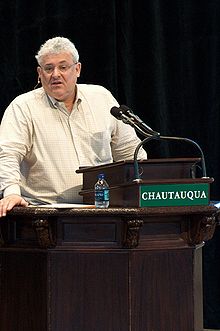Brigitte Boisselier
In 2003, impressed with her management of Clonaid and public relations skill, Raël, the founder of Raëlism, announced that Boisselier would succeed him as the group's leader upon his death.
[6] The hostility was fueled in part by public concerns about new religious movements after deaths caused by the Order of the Solar Temple in Europe during the mid-1990s.
[2][3] That year, Boisselier was interviewed by Le Monde about her role in Clonaid,[3][7] and she lost her position with Air Liquide after the company learned of this.
[7] In August 2000, Mark Hunt, a politician from West Virginia, asked Boisselier to clone his late son, who had died as a child.
[14] Some commentators initially accepted her work as a legitimate attempt at cloning; Margaret Talbot of the New York Times described her as a more credible spokesperson than Raël, projecting what she described as "an air of cool, academic professionalism".
[10] Boisselier's striking physical appearance drew particular attention, and she developed an avant-garde, stylish reputation, contrary to popular images of scientists.
Boisselier said that the Food and Drug Administration also surreptitiously investigated her,[15] and Raël claimed that U.S. President George W. Bush was concerned about Clonaid's work.
They spoke with the FDA, who searched the site and persuaded Boisselier to suspend her cloning work pending legal clarification.
[15] After Hunt was asked by the laboratory's caretaker to shut down the cloning operation, he broke with Boisselier and criticized her for seeking media attention.
[20] On 7 August 2001, Boisselier attended a widely publicized human cloning symposium at the National Academy of Sciences in Washington, D.C., Significant media attention was given to Boisselier, who, along with Severino Antinori and Panayiotis Zavos, was one of three participants actively engaged in efforts to produce a human clone.
[21] The rest of the attendees were renowned scientists and ethicists, one of whom, Arthur Caplan, dismissed Boisselier as part of the "loony cloning element".
[23] Boisselier confidently announced at a press conference in Florida in December 2002 that Clonaid had successfully produced a live-born clone, named Eve, for an infertile couple.
[26] After the announcement, Boisselier received abundant press, but the media, particularly late-night comedy programs, criticized her glamorous appearance and mocked Raëlism.
[29] Raël and Boisselier attacked the filing as an attempt to take a child from loving parents and announced that, in protest, they would not provide DNA for testing.
[27] An arraignment occurred on 24 January and was televised live on CNN; Boisselier and Clonaid's vice president, Thomas Kaenzig, were subpoenaed in lieu of the child's parents.
[35] While discussing Boisselier's management of Clonaid, Palmer notes that it is impossible to know why she stated that a clone was produced but then refused to provide evidence.
She argues that her refusal to provide evidence may have been because she organized a hoax, did not wish to publicize the birth of an unhealthy child, or was taken advantage of by a scientist she had hired.
[32] American science journalist Steven S. Hall criticized the media for their coverage of Clonaid, believe that they were inaccurately represented as a credible group.
[42] Raëlians emphasize sexual stimulation as a way to positively change their members,[43] and Boisselier has stated that she sees the pursuit of femininity as a method of spiritual growth.
[44] The group highly values feminine beauty, and Raël has applauded Boisselier for maintaining her appearance, casting her as a role model.
She heads a Raëlian-affiliated group known as Clitoraid, which raises funds to provide restorative surgery to women with damaged clitorises.
The project, which has attracted criticism of its effectiveness, aims to build a hospital in Burkina Faso where women can receive clitoral surgery.

